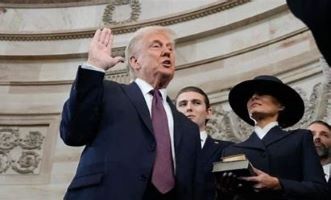A Review and Breakdown of Donald Trump’s Policy Reforms:
Sparked Controversies and Global Effect
Donald Trump’s return to the presidency has been marked by a flurry of policy reforms, sparking intense controversy and debate.
As the 47th President of the United States, Trump’s administration has introduced a raft of changes impacting areas such as immigration, trade, healthcare, and climate change.
This review provides an in-depth examination of six key policy reforms, exploring their implications for the global landscape and the lives of Americans.
-
Ends Citizenship by Birthright
President Trump has sparked controversy with an executive order aimed at stripping birthright citizenship from children born in the US to undocumented or temporary immigrant parents.
This move targets a longstanding constitutional right that grants automatic citizenship to anyone born on American soil.
The order claims that children of undocumented immigrants are not under US jurisdiction and therefore ineligible for citizenship.
However, this claim has been met with fierce opposition from legal experts, immigrant rights groups, and state attorneys general.
Critics argue that revoking birthright citizenship would require a constitutional amendment, not a presidential decree.
The American Civil Liberties Union (ACLU) has already filed a lawsuit, calling the move “illegal, cruel, and contrary to American values.”
The order’s impact could be far-reaching, affecting an estimated 1.3 million US-born adults whose parents lack legal status.
Experts warn that ending birthright citizenship could lead to a surge in unauthorized immigration, causing widespread social and economic disruption.
As the battle over birthright citizenship heads to the courts, one thing is clear:
President Trump’s executive order has ignited a fierce debate over the future of immigration in America.
A Review and Breakdown of Donald Trump’s Policy Reforms:
-
Suspends Refugee Program
President Trump has issued an executive order that effectively shuts down the US refugee program.
The order, which takes effect on January 27, 2025, cites national security and public safety concerns as the reason for the suspension.
The move marks a significant shift in US refugee policy, which has traditionally prioritized the resettlement of individuals fleeing persecution and war.
Under the new order, refugees will only be admitted on a case-by-case basis if they are deemed to be in the national interest.
The suspension is initially set to last for three months, but it could be extended indefinitely.
The order also requires the Secretaries of State and Homeland Security to review existing laws
and propose changes to increase state and local involvement in refugee resettlement.
The move has already sparked controversy, with refugee advocates warning of the devastating impact on vulnerable populations.
The suspension is expected to have far-reaching consequences for the US refugee program
and the thousands of people who rely on it for safety and protection.
A Review and Breakdown of Donald Trump’s Policy Reforms:
-
External Revenue Service
President Trump has introduced the External Revenue Service, a new government agency tasked with collecting tariffs and duties from foreign countries.
This move aims to reshape the US trade landscape, promote fair trade practices, and boost the domestic economy.
The External Revenue Service will generate significant revenue for the US economy by ensuring that countries benefiting from trade with the US contribute their fair share.
This revenue can be reinvested to support domestic industries and create jobs.
However, concerns have been raised about the potential impact on international trade and consumers.
Businesses may face increased costs and regulatory hurdles, leading to higher prices for goods in the US market.
The agency’s role may also lead to increased tensions with trading partners, potentially disrupting global supply chains.
The Trump administration aims to use the External Revenue Service to streamline trade operations and reduce bureaucracy.
And The agency will be overseen by the Department of Government Efficiency, which is tasked with identifying areas for improvement in government operations.
As the External Revenue Service begins its work, its effectiveness and implications for the US economy will be closely watched.
A Review and Breakdown of Donald Trump’s Policy Reforms:
-
Pulls Out of WHO
President Donald Trump has withdrawn the United States from the World Health Organization (WHO), sparking widespread concern among health experts.
The decision, which has been met with criticism, cites the WHO’s handling of the COVID-19 pandemic,
its failure to adopt reforms, and its alleged lack of independence from political influence as reasons for the withdrawal.
Health experts warn that this move will make the US and other countries less safe from infectious diseases and other public-health threats. World Health Organization (WHO)
By withdrawing from the WHO, the US will lose access to the organization’s database of changing influenza strains,
which could lead to more Americans being hospitalized and dying from flu infections.
Additionally, the US will also lose access to the global database of health information, making it more vulnerable to microbial threats from around the world.
The US withdrawal from the WHO will also have significant implications for global health policy.
Consequently, The US will no longer be able to shape global health policy and will lose its role as a leader in international health efforts.
Furthermore, the WHO will lose a significant source of funding, which could have a devastating impact on its ability to respond to global health crises.
Health experts are urging the US to reconsider its decision and to work with the WHO to address its concerns.
A Review and Breakdown of Donald Trump’s Policy Reforms:
-
Pulls Out of Paris Agreement
President Donald Trump has made a significant move on his first day of his second term,
withdrawing the United States from the Paris Agreement, an international accord aimed at combating climate change. The Paris Agreement | UNFCCC
This decision marks a major setback for global efforts to address the growing threat of climate change.
The Paris Agreement, signed in 2015, brings together nearly 200 countries in a collective effort to limit global warming to well below 2 degrees Celsius.
The agreement’s goal is to prevent catastrophic climate change, which is already having devastating impacts around the world.
By withdrawing from the agreement, the US is essentially abandoning its commitment to reducing greenhouse gas emissions and transitioning to clean energy.
This move is particularly concerning given the US’s status as one of the world’s largest emitters of greenhouse gases.
The country’s participation in the Paris Agreement was seen as crucial to achieving the agreement’s goals,
and its withdrawal will likely have far-reaching consequences for the global effort to address climate change.
The international community is urging the US to reconsider its decision and rejoin the Paris Agreement.
The United Nations has emphasized that the door remains open for the US to reenter the agreement,
and many countries are hopeful that the US will eventually return to the negotiating table.
However, for now, the US’s withdrawal from the Paris Agreement is a significant blow to global efforts to address climate change.
A Review and Breakdown of Donald Trump’s Policy Reforms:
-
Recognises Only Male and Female
President Trump’s executive order that redefines sex as solely male or female has ignited another firestorm of controversy.
It sought to effectively erase federal recognition of transgender and nonbinary individuals.
According to scientists, health experts, and advocacy groups, this move disregards the complexity of human biology.
The order’s definition of sex as immutable and binary is a gross over-simplification of the intricate and multifaceted nature of human biology, researchers argue.
Intersex individuals, who make up an estimated 2% of the population, are ignored by this definition.
As noted by experts, gender is a spectrum rather than a binary construct, and this order contradicts that understanding.
According to advocacy groups, the consequences of this order will be severe,
exacerbating existing health disparities and putting vulnerable individuals at greater risk of harm and discrimination.
Federal funding for research into the health outcomes of transgender, nonbinary, and intersex individuals is also at risk,
which could further worsen health disparities, experts warn.
As stated by advocacy groups, the order is a discriminatory and unscientific attempt to roll back the rights of marginalized communities.
The move has sparked widespread outrage,
with many calling for the order to be reversed and for the federal government to recognize and respect the identities and experiences of all individuals.
In conclusion, President Trump’s policy reforms will have lasting implications that will be felt for generations to come.
As the world navigates these changes, it’s crucial to consider their impact on international relations, global health, and the environment.
From an African perspective, these reforms serve as a wake-up call – a reminder that it’s time for Africans and their leaders to take ownership of their continent’s development.
Just as Trump has prioritized America’s interests,
Africans must adopt an “Africa First” approach, focusing on building robust economies, investing in infrastructure, and fostering regional cooperation.
By grasping the complexities of these reforms, Africans can better prepare for the challenges and opportunities that lie ahead, ultimately shaping a brighter future for the continent.
Also Read: We all seek happiness. We are all searching for love. – Diademng
A Review and Breakdown of Donald Trump’s Policy Reforms: Sparked Controversies and Global Effect
















